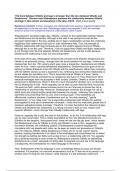Summary
Summary A* 25/25 AQA English Literature Othello essay - ‘The bond between Othello and Iago is stronger than the love between Othello and Desdemona’ (2023 exam)
My 25/25 (A*) essay, with the examiner's comment, from the 2023 A-level exam on: ‘The bond between Othello and Iago is stronger than the love between Othello and Desdemona’. Discuss how Shakespeare presents the relationship between Othello and Iago in this extract and elsewhere in the play.
[Show more]





